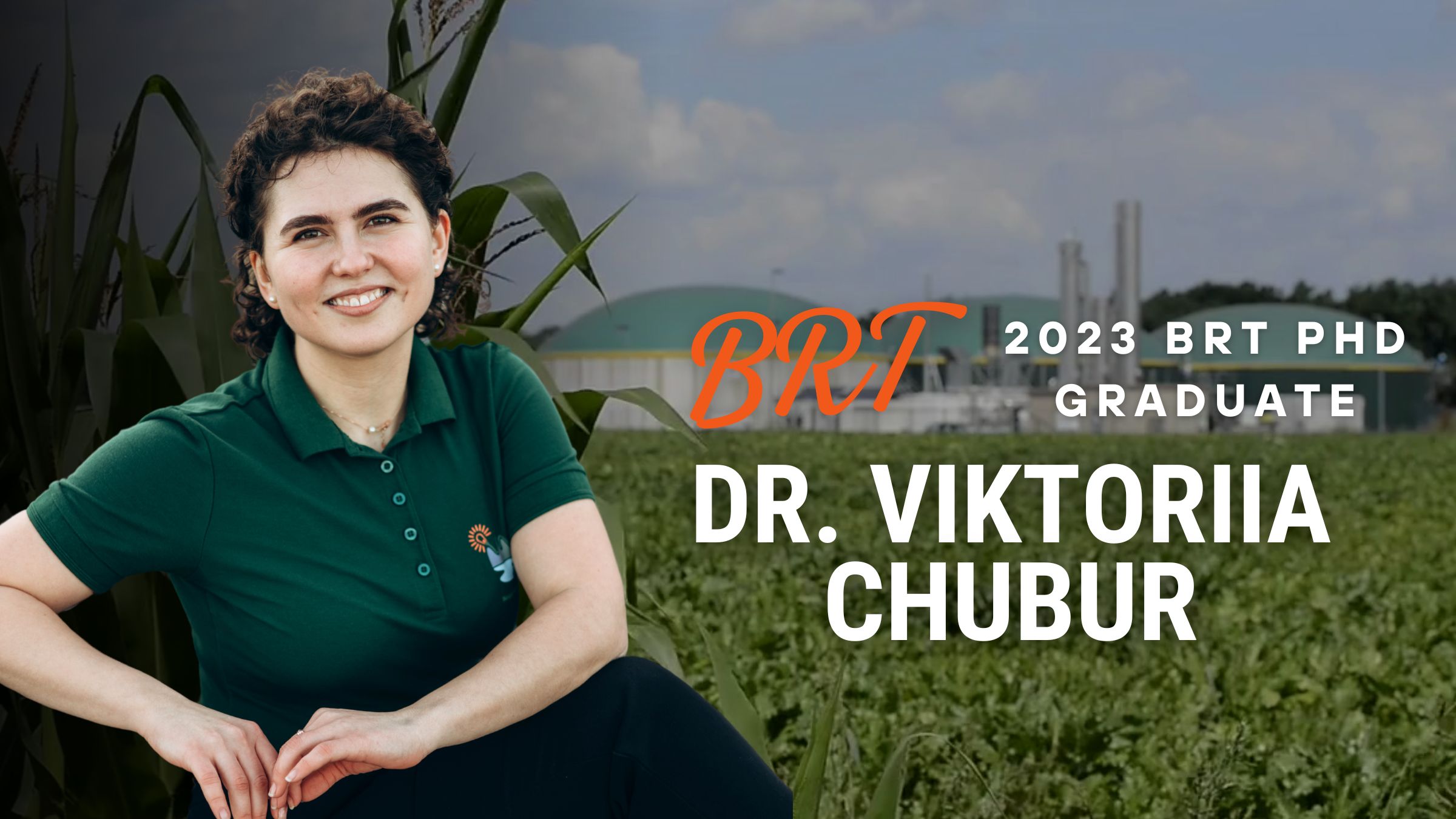Dr. Viktoriia Chubur earned her Ph.D. in Environmental Protection Technology under the supervision of Assoc. Prof. Dr. Yelizaveta Chernysh (Sumy State University (Ukraine)) and Assoc. Prof. Dr. Hynek Roubik (Czech University of Life Sciences Prague). Her research focused on waste utilization technologies, biogas technologies, anaerobic fermentation, and mitigating environmental impact. Her research topic was ‘Environmentally safe utilisation of waste for energy purposes in environmental protection technologies’.
Dr Chubur has coauthored 10 scientific publications, participated actively at international conferences, and participated in 4 internships during the 3 years of her doctoral studies. She has been a member of the BRT at the Czech University of Life Sciences Prague and the Head of the TeSET Faculty Scientific Association at Sumy State University (Ukraine) since the first year of her studies.
To get more insights into Dr. Chubur‘s academic journey, our BRT Communications team conducted an interview to capture her thoughts and share her story.
ENJOY THE INTERVIEW!
Question 1: How does it feel to have successfully defended your doctoral dissertation?
Dr. Chubur: It brings a sense of freedom and confidence in the next steps in my research career. The defence is a milestone that summarises the set of skills I’ve acquired as a young scientist.
Question 2: Can you share pivotal moments from your academic journey that you believe were crucial in successfully defending your doctoral dissertation?
Dr. Chubur: The internships I completed were a valuable experience that allowed me to work and train in laboratories across Germany, Austria, the Czech Republic, and Ukraine. Building skills and gaining diverse experience bolstered my abilities as a successful researcher. Maintaining good connection and cooperation with my supervisors was also crucial for guidance and in supporting my research throughout my PhD studies.
Question 3: Reflecting on the process, what were the significant challenges you encountered while writing your dissertation and defence phases, and how did you navigate through them?
Dr. Chubur: My personal challenge was time management during the final manuscript writing and defence preparation stages. Time is always scarce, but it also forces efficiency in writing and structuring work. Planning and support from colleagues in organizing the initial stages helped me meet all the deadlines.
Question 4: Balancing academic commitments, personal life, and other responsibilities can be demanding. How have you managed to strike that balance while working on your dissertation?
Dr. Chubur: I struggled with this during my PhD, as I usually put off personal matters until a later time due to being extremely focused with the tasks relating to my studies. However, it was important for me to realize that there is no limit to perfection and to start rationally evaluating my tasks. With the start of the full-scale Russian invasion of my home country, Ukraine, in February 2022, I was presented with the reality of focusing all my attention on the safety of my loved ones. Everything changed at this point, and I was forced into needing to distinguish between work and my primary priorities.
Question 5: What valuable advice would you offer for fellow doctoral candidates preparing for their dissertation defence?
Dr. Chubur: Focus on presenting achievements that have already been critically evaluated and hold value (because they were presented and reviewed a few times before). Pay attention to the personal experience gained throughout your Ph.D., as it is invaluable, and do not put yourself down in comparison to others.
Question 6: Do you have any recommendations for current and future BRT students?
Dr. Chubur: I recommend pursuing internship opportunities as much as possible. Since your research is still in progress, you can get insights and evaluations from specialists in your field. It can shape the direction of your research or provide interesting ideas to expand your scope.
Question 7: Now that you have reached this momentous achievement - What are your plans for the future?
Dr. Chubur: My focus for the future is on applying my expertise in more practical ways through projects with tangible outcomes. Additionally, I'm committed to further developing my skills with the aim of sharing my experiences with others through mentorship or teaching. I currently work at BRT as a postdoctoral researcher, where I see myself working for the foreseeable future.
We thank Dr. Chubur for sharing insights into her academic journey and wish her success, new discoveries, and a continued sense of fulfilment in his future endeavours!
Viktoriia is now the BRT lab coordinator and a post-doctoral researcher! With her extensive knowledge, dedication, and passion for advancing scientific innovation, she has already proven to be an invaluable asset to our team. We are confident that her leadership and expertise will drive our lab’s research forward in exciting new directions. A huge thank you to Viktoriia for her unwavering hard work!
For more details on BRT activities, subscribe to our newsletter or follow us on social media for regular updates and highlights.


